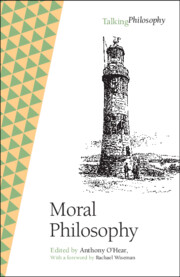Book contents
- Moral Philosophy
- Talking Philosophy
- Moral Philosophy
- Copyright page
- Contents
- Foreword
- Preface
- List of Contributors
- Rationality and Goodness
- Acting well
- Apprehending Human Form
- Does Modern Moral Philosophy Rest on a Mistake?
- Absolutes and Particulars
- On the So-called Logic of Practical Inference
- Absolute Prohibitions without Divine Promises
- Moral Obligation
- The Lesser Evil
- The Ethics of Co-operation in Wrongdoing
- Authority
- The Force of Numbers
- Reason, Intention, and Choice
- Modern Moral Philosophy and the Problem of Relevant Descriptions
- Index
Apprehending Human Form
Published online by Cambridge University Press: 19 May 2022
- Moral Philosophy
- Talking Philosophy
- Moral Philosophy
- Copyright page
- Contents
- Foreword
- Preface
- List of Contributors
- Rationality and Goodness
- Acting well
- Apprehending Human Form
- Does Modern Moral Philosophy Rest on a Mistake?
- Absolutes and Particulars
- On the So-called Logic of Practical Inference
- Absolute Prohibitions without Divine Promises
- Moral Obligation
- The Lesser Evil
- The Ethics of Co-operation in Wrongdoing
- Authority
- The Force of Numbers
- Reason, Intention, and Choice
- Modern Moral Philosophy and the Problem of Relevant Descriptions
- Index
Summary
My immediate aim in this lecture is to contribute something to the apt characterization of our representation and knowledge of the specifically human life form, as I will put it—and, to some extent, of things ‘human’ more generally. In particular I want to argue against an exaggerated empiricism about such cognition. Meditation on these themes might be pursued as having a kind of interest of its own, an epistemological and in the end metaphysical interest, but my own purpose in the matter is practical-philosophical. I want to employ my theses to make room for a certain range of doctrines in ethical theory and the theory of practical rationality—doctrines, namely, of natural normativity or natural goodness, as we may call them. I am not proposing to attempt a positive argument for any such ‘neo-Aristotelian’ position, but merely to defend such views against certain familiar lines of objection; and even here my aims will be limited, as will be seen.
- Type
- Chapter
- Information
- Moral Philosophy , pp. 74 - 117Publisher: Cambridge University PressPrint publication year: 2022

